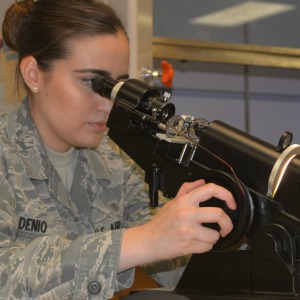Texas Guardsmen contribute medical relief effort
Story by: Staff Sgt. Kristina Overton
Posted: July 20, 2016
 U.S. Air Force Senior Airman Alexandra Denio, 136th Medical Group, Texas Air National Guard, medical technician, checks the current prescription on a patients classes during the Greater Chenango Cares Innovative Readiness Training mission in Norwich, N.Y., July 20, 2016. The mission is a 10-day real world training exercise, providing medical, dental, optometry, and veterinary services at no cost the community. (U.S. Air National Guard photo by Staff Sgt. Kristina Overton)
U.S. Air Force Senior Airman Alexandra Denio, 136th Medical Group, Texas Air National Guard, medical technician, checks the current prescription on a patients classes during the Greater Chenango Cares Innovative Readiness Training mission in Norwich, N.Y., July 20, 2016. The mission is a 10-day real world training exercise, providing medical, dental, optometry, and veterinary services at no cost the community. (U.S. Air National Guard photo by Staff Sgt. Kristina Overton)
In an effort to provide medical relief, nine members from the 136th Airlift Wing, Texas Air National Guard, at the Naval Air Station Fort Worth Joint Reserve Base, deployed to Chenango County, New York, to support The Greater Chenango Cares Innovative Readiness Training mission July 20, 2016. The mission began July 15.
The 10-day real-world joint training exercise, ending July 24, allows for military service members to practice their skills in preparation for wartime operations while also providing a needed service to underserved communities.
“This is my first humanitarian mission and it has been such a great experience so far,” said Lt. Col. Harry Moore, 136th Medical Group public health preventative medicine officer. “Essentially, there aren't enough medical providers in the area and the population is greatly underserved. The services we provide are at no cost to the community and the patients have shown so much appreciation. We can really see the benefit that these services are having on the civilian population.”
Services are comprised of quality dental, optometry, veterinary, and medical services. In Chenango County, there is approximately one dentist to every 3,000 patients. With a population of more than 50,000, the understaffed medical field and lack of medical insurance have increased the overall need for assistance and is extremely beneficial to the community.
“We also provide health and nutrition education, as well as have a pharmacy to provide up to two weeks worth of medicine for patients in our care,” Moore said. “Our physicians can also give patients referrals for follow-up care and additional medication once their prescriptions run out. This ensures that they have the ability to maintain their health long-term.”
In 2015, the mission was able to help more than 4,000 residents in Chenango County. To better serve the community this year, the facilities have expanded to two locations, one in Norwich and one in Cortland. The separation will allow for an easier and more efficient method of dispersing medical services to individuals within the region. The goal for 2016 is to maintain or expand their patient outreach from 2015, continuing to offer necessary services. A huge contributor to the effort is the Chenango County United Way.
“I’ve been at the United Way for 17 years, and we’ve never done anything that’s as impactful as this project,” said Elizabeth Monaco, Chenango United Way executive director. “As chaotic as the process is to get to this point, I’m already sad about when it’s going to end. It’s life changing—for me too—as much as it is for the people we are serving. It does so much for the community.”
The United Way is the lead agency for the IRT and raised more than $40,000 to contribute to this effort. The organization’s mission is to assist with national income, education and health deficits, which tie in well with the overall project. Along with their executive committee, they recruited and trained more than 500 volunteers.
“There is something broken,” Monaco said. “There is a need that is not being fulfilled. Even with Obamacare and other programs that are set up, there are people who are unserved and it’s just not ok. If people don't have basic healthcare then they cannot accomplish other things. We have to do something to address it, and this effort is a step in that direction.”